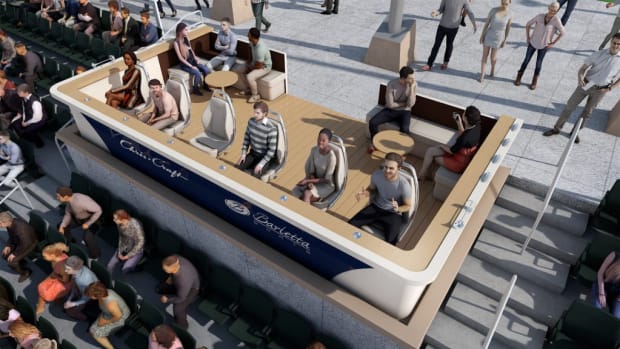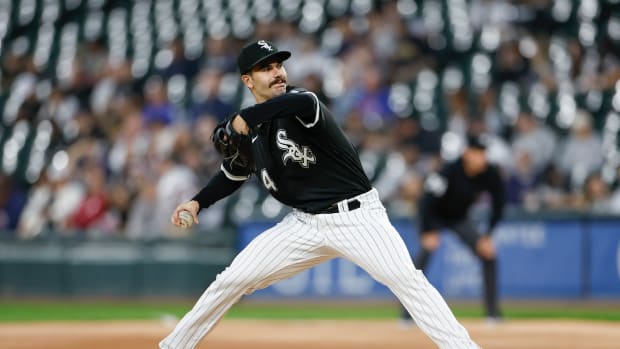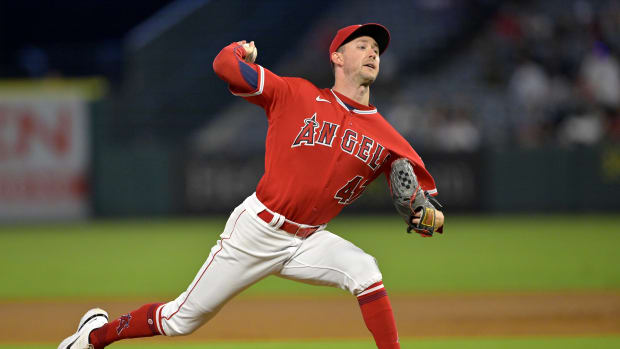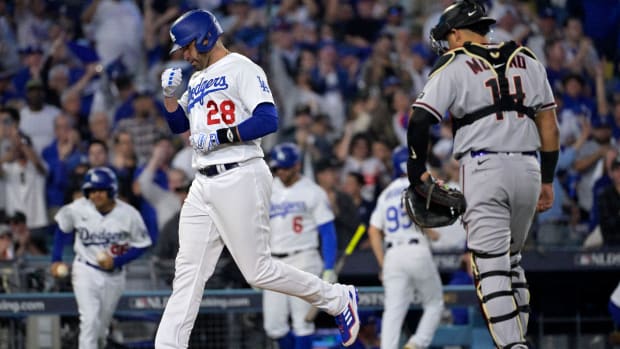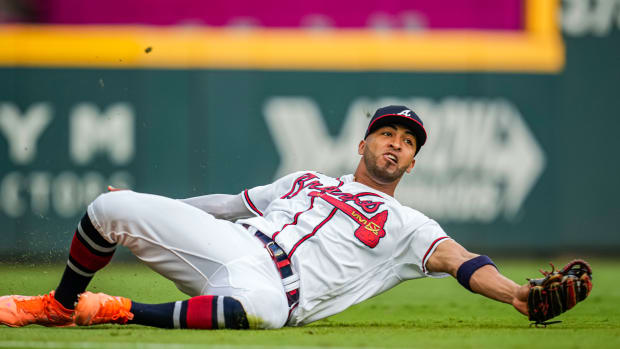ALDS Preview: Red Sox-Angels
You don't see this every day. This AL Division Series features the team with the best record in the league against the best team in baseball. As a reward for winning 100 games, the Angels get to try and beat the defending champions, the team with the best run differential in the AL, the best defense in the AL and far and away the best third-order record in baseball. That's all. Meanwhile, the Rays will draw the weakest team in the field on 38 hours' rest.
Of course, the question is whether the Red Sox that take the field on Wednesday night in Los Angeles of Anaheim are that caliber of baseball team. Already, their nominal ace is down to one start in the series, maximum, while their starting third baseman and right fielder, who combined for 42 at-bats in September, are questionable for the opener. The healthy Red Sox are better than the healthy Angels, but that may not be the matchup that we get this week.
The Red Sox could start both Mike Lowell and J.D. Drew, one of the two, or neither of them. It's a guessing game until Terry Francona fills out his lineup card. I split the difference here based on a Providence Journalblog report that Drew looked fine during batting practice in Anaheim on Tuesday, but there's still no telling. Lowell seems less healthy, and since the Sox have slightly better options in his absence, we'll go with the above. Lowell would bump Sean Casey to the bench and Kevin Youkilis to first, and probably shuffle the 5-7 lineup spots. Coco Crisp will play for Jacoby Ellsbury against Joe Saunders, and possibly for Drew in Game 1 if Drew can't go, Mark Kotsay being the other option.
There's definitely a drop-off if the two stars can't play. The absence of Drew leaves the Sox a bit OBP-shy, while Lowell has power that Casey doesn't. Missing one of them isn't devastating, but missing both closes the gap between the Sox and Angels significantly. It's not going to be a bad offense, regardless; it's only championship-caliber if everyone plays and is healthy.
Oh, the Sox improved at the trade deadline, and I mean on the field. Manny Ramirez was batting .299/.398/.529 when he was traded. Jason Bay hit .293/.370/.527 for the Sox, and his defense made up for the missing intentional walks that create the OBP gap.
The Angels have everyone healthy, and the lineup above is more or less what they ran out there in the last week of the season. That could work on Wednesday night against Jon Lester, but Kendry Morales should get some time against Daisuke Matsuzaka and the Sox' other righties, most likely in Juan Rivera's slot. The use of Garret Anderson in the two slot is something different; his .344 average there means it worked down the stretch for a team that didn't have a clear number-two hitter, although his four walks in 22 games in that spot show that he didn't change much in terms of his approach. Anderson is a slow hitter prone to double plays and needing to get results on balls in play. His GIDP count will be a key stat in this series.
These are not your older brother's Angels. While they still emphasize contact hitting and aggressive baserunning, the roster simply doesn't have much speed. Only Chone Figgins, Torii Hunter and Erick Aybar have above-average speed, and a number of these guys are downright slow. The Angels were 11th in the AL in OBP, so avoiding outs on the bases will be critical.
Keep in mind that the full-season stats don't quite give you the full picture of this offense. He didn't get a fraction of the attention Ramirez did, but Mark Teixeira changed the Angels lineup in much the same way that Ramirez did the Dodgers'. As a high-OBP, high-SLG switch-hitter, he's the one player in the lineup, even more than the aging Vladimir Guerrero, who brings a complete game to the plate. The Angels scored 5.1 runs per game with him, as opposed to 4.6 before his arrival.
If everyone is healthy, the Sox won't use their bench very often. Alex Cora plays defense for Jed Lowrie, and Crisp platoons with Ellsbury and may play defense for Drew if Drew's back gives him any problems in the field. Francona won't pinch-hit for Jason Varitek and will rarely pinch-run for him, so there's no argument for carrying David Ross to free him up to do so and still have a backup catcher (Kevin Cash).
The Angels can use Gary Matthews Jr. and Reggie Willits as legs for Guerrero and Anderson, pinch-hitters for Aybar and, on occasion, Mike Napoli. Morales deserves at-bats against right-handers, but really, the Angels have a whole bunch of suboptimal DH choices. Their best play is probably to start Willits or Matthews in the outfield and DH Guerrero or Anderson, at least gaining something on defense. Mike Scioscia did that with Matthews a fair amount this season, but it's not clear what he'll do this week. It's not a great bench, but at least there are six men on it, which is the number every team should have. If it's not seven, anyway.
The injury to Beckett leads the Sox to ordering their starters by 2008 performance, which isn't such a bad thing. Whether Beckett can pitch in Sunday's Game 3 is uncertain, although he is expected to do so. The drop-off from Beckett to Paul Byrd or Tim Wakefield is significant over a season, but small in any one start.
The Angels' decision to take the longer series is peculiar, because they have a significant edge over the Red Sox in the fourth rotation slot no matter who pitches. By allowing the Sox to skip that slot and bring back Lester on full rest in Game 4 -- the Sox have yet to commit to this -- they gave away value. This is probably the most evenly matched element between the teams in a short series because of that decision. They themselves will push both Jeff Weaver and Jon Garland to the pen, giving them all-important redundancy in long, long relief. Leaving Garland off of the roster would have been a better choice.
Sox fans head into October a bit nervous about their pen, not unlike how they entered October 2007. That worked out all right. The key element here is Justin Masterson, the nasty side-armer who is a better reliever than starter. The Angels, with just one big-time lefty power threat in Teixeira, could be vulnerable to multi-inning outings by Masterson in which he mows down their many righties. It's why I list him ahead of Manny Delcarmen above; he'll be more important than MDC, and maybe more important than Hideki Okajima, in this series.
The Angels' bullpen is well-known, has been long before Rodriguez ripped off a new single-season saves record this season. With Scot Shields back to form after a rough 2007 and new arm Jose Arredondo stretching the pen's dominance into the seventh, the Angels are once again a team you want to beat in the first six innings. The lack of a lefty specialist is worth noting; Darren Oliver has never been that guy, and the Sox are actually a team that makes it worth having one around, with David Ortiz and Drew. Scioscia should remember that he's managed almost his entire career without a LOOGY, and go after those two with his best relievers, rather than messing around with Oliver in a key spot, the way he did with Jarrod Washburn a few years ago.
The Angels' decline in baserunning is mirrored by the degradation in their defensive performance, which is slightly below average per Park-Adjusted Defensive Efficiency. With aging legs on the outfield corners and an ever-changing middle infield, this is something short of surprising, but look for the discussion of the Angels this week to reference their great defense repeatedly. This will overlook that the Red Sox have the best defense in the AL, with the league's best first baseman and candidates for "best" at second base, third base and center field. With a strikeout staff and a great defense, you have to beat the Sox with short-sequence baseball -- home runs. That is not the Angels' game, even with Teixeira.
There's not much of a difference here, as you have two of the very best in the game, managers of three of the last six world champions. Each runs a bullpen well, each avoids going too long with starters and neither is prone to the big mistake. We can nitpick any individual decision, but on balance neither team has an edge, and neither will be hurt by its man in the dugout. If there's something to watch, it's whether Scioscia lets his team be overly reckless on the bases, given that they won't have many baserunners to play with.
The Angels have lost nine consecutive postseason games to the Red Sox, and were swept out of last year's Division Series almost without a fight. With that said, the roles are a bit reversed this time; the Angels come in mostly healthy, while the Sox are fighting injuries. That could make the difference. It's hard to make a prediction without knowing the status of Drew, Beckett and Lowell, and even that statement implies that it would be easy to do so if we did. It wouldn't be. These are two of the best teams in baseball playing three to five games. There is no result -- a sweep, a five-game series, either team winning -- that would come as a surprise. With that said, I'll go with the better team when healthy, and say Red Sox in four.






























